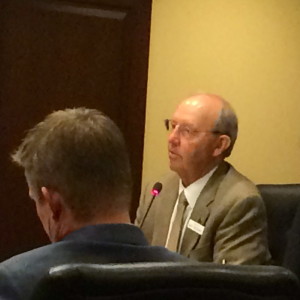The legislative “working group” examining Idaho’s tax code worked over some familiar tax issues Wednesday morning.

“We’re not looking for ways to tax our citizens more, tax our businesses more.”
The “personal property tax” on business equipment and furnishings. Corporate and individual income tax rates. Sales taxes on Internet purchases. The size and scope of the sales tax exemptions.
And the work is only getting started. The panel of 12 lawmakers agreed to meet Nov. 3, Election Day, and several panel members said the group should schedule public hearings. Beyond the Nov. 3 meeting, however, the committee’s calendar is unclear.
For state programs — starting with K-12 — the potential implications are clear. Legislative leadership has asked the working group to review the state’s matrix of sales, corporate and personal income taxes. These taxes account for the bulk of Idaho’s $3 billion general fund budget. At nearly $1.5 billion, K-12 spending accounts for 48 cents on every general fund dollar.
And so, while Wednesday’s audience was composed largely of business lobbyists, Tim Corder also attended portions of the meeting. The former state senator is Superintendent of Public Instruction Sherri Ybarra’s point man in Statehouse committee hearings. The turnout isn’t unexpected. The working group’s deliberations could go a long way toward setting the tone for future debates about changes in the tax structure, and the effect on funding for schools and other state services.
After nearly four hours, devoted largely to presentations on aspects of the state tax code, the working group left with its schedule in limbo — and no clear sense of its focus. Leadership assembled the working group to scrutinize the state’s tax code, with an eye toward Idaho’s competitive posture. But one of the working group’s short-range objectives might be more pragmatic: to lay the groundwork for the 2016 session that begins in January, averting the end-of-session rush that marked the debate over tax legislation in 2015.
Even at that, the working group’s jurisdiction is limited. The working group can really only suggest tax bills, said Sen. Jeff Siddoway, the chairman of the Senate Local Government and Taxation Committee. Any suggestions would have to go through the House before ever reaching Siddoway’s committee, the Senate floor and, possibly, Gov. Butch Otter’s desk.
Meanwhile, another problem could confront the 10 Republicans and two Democrats on the working group. They may have decidedly different ideas about what tax reform should look like.
Sen. Jim Guthrie, R-McCammon, put in a plug for flattening Idaho’s individual income tax rates, which range from 1.6 percent to 7.4 percent. Sen. Grant Burgoyne, D-Boise, suggested focusing on sales tax relief, to ease the sting on working families that have seen little benefit from past tax cuts. Sen. Lori Den Hartog, R-Meridian, also said tax relief should be directed at families, in light of the 2015 Legislature’s decision to boost gasoline taxes.
Underlying the tax debate are clear splits in philosophy — as illustrated Wednesday by an exchange over the fate of rural Idaho. Sen. Steve Vick, R-Dalton Gardens, blamed rural Idaho’s plight on federal timber policies. Rep. Dell Raybould, R-Rexburg, said Idaho can improve its tax base by attracting natural resource industries. Rep. Mat Erpelding, D-Boise, said small towns are suffering as young families flee for better jobs elsewhere — while those who remain are forced to go to great pains to support local schools through supplemental property tax levies.
“You are watching the slow painful death of rural communities,” he said.
